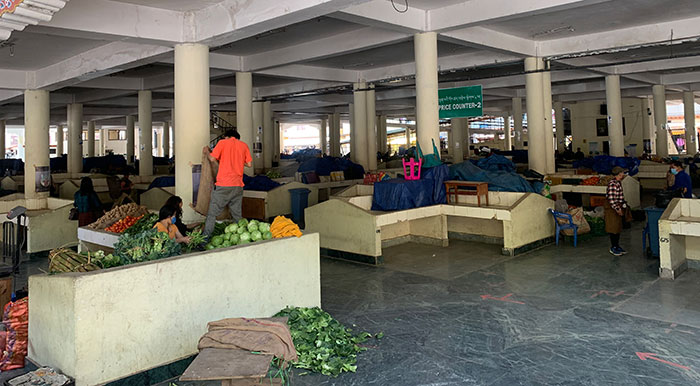The market has changed lives of many
Yangyel Lhaden
The lucrative business at the Centenary Farmers’ Market (CFM) is one of the main reasons why vendors are trying to hang on to the CFM even after the announcement of its closure.
Vendors said that on an average, they earn between Nu 2,000 and Nu 4,000 daily. On weekends they earn between Nu 15,000 and Nu 20,000 a day depending on the location and their network.
In an effort to protect their business, vendors appealed to the government to allow them to do business at one-third of its capacity. The CFM opened on Wednesday at one-third capacity.
To maintain one-third capacity at the CFM, each vendor can sell for a week and have to wait for two weeks until their next turn to sell for another week. Vendors said that selling at the CFM for a week would be more profitable than selling at other locations for a month.
A vendor said that at least 60 percent of the vendors have become rich doing business from the CFM for years while the remaining earn just enough to sustain.
A single mother of eight, Dema Lhamo said that there was a potential to become rich by vending at CFM if one had financial discipline. “None of my ex-husbands support me, I raise my eight children alone,” she said.
C.B Tamang, 27, from Dagana started doing business at CFM seven years ago and saved enough to build a house in Dagana. “Getting a space to sell at the CFM is tough but once you get it, a good source of income is ensured,” he said. The vendor got the space after his mother-in-law expired. Like Tamang, many vendors try to continue business at the CFM and pass down the license to operate to their children and relatives.
Sonam Dorji came to Thimphu as a day labourer. He is 61 today. He lives in a Nu 18,000 apartment and self-financed college education of his three children. “It was all possible because of the CFM,” he said.
The market has not only provided a livelihood, but also helped many women become financially independent. A single mother of two, Nim Dem from Paro raised her children with her business at CFM. “I financed my son’s college education,” said Nim Dem. “I can comfortably provide good education to my other child if I continue selling from the CFM.”
Nim Dem said she wouldn’t be selling from Chang Gidaphu, the spot she received during the “lucky dip” the thromde organised earlier this month. She is disappointed. “Only wild animals might come to buy vegetables,” she said.
Some vendors said that sales and earnings depended on personal relation and networking. A vendor said that her income from vegetables was largely from supplying to hotels in the capital. “Even if the CFM closed, I will depend on supplying to hotels,” said the woman whose husband is working in a private association and two sons working as an architect and an engineer.
Vendors are charged from Nu 750 to 1,400 a week on the ground floor while all the vendors in the farmers’ section, first floor pays Nu 500 a week. A vendor selling dry fish said his income was enough to see through the lockdown. “I spent my time watching television,” he said.
Another vendor, Tshering Wangmo, said that she was affected when she lost the only source of income because of the lockdown. “I had not saved enough and did not see the crisis coming. I was comfortable when the market was open,” she said.
Many are waiting how business would pick up once they move out to the new markets being readied by the thromde. “Decongesting the CFM would happen depending on how good businesses in the new markets would be,” said a vendor Sonam Penjore. “To us business is the priority and we will go where business is better.”


